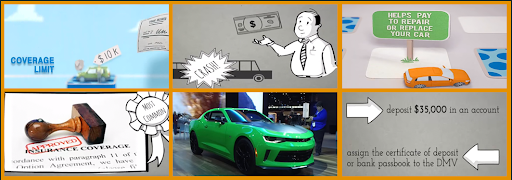It is considered a truism by insurance companies and actuaries that the more stable and consistent the risk characteristics are of an insured, the lower the necessary rates. Auto insurance actuaries are always trying to identify the qualities and behaviors of customers that demonstrate stability. They give better rates to these people because they have fewer losses. In short, historical loss experience has shown that greater stability means that fewer claims will occur.
For example: based on a person’s set of characteristics we can expect 4 out of 100 people (or 4%) with similar characteristics to have a loss in the next year. This estimate for the number of losses that will occur in the future is based on what has historically happened with this group of customers. Bottom-line:
Increased Stability => Fewer Losses => Lower Rates
Let’s examine this truism more closely by looking at a couple of customer characteristics that will help to illustrate the point.
Driver Age – This one is pretty easy, and every state regulatory department buys into it. The older, and more experienced a driver is, the fewer accidents they will have. Therefore, the rate of 40-year-old drivers is less than the rate for 16-year-old drivers. In terms of the historical number of losses, 16-year-old drivers may have 12 accidents per 100 policies, while 40-year-old drivers may have only 4 per 100 policies. This means that a 16-year-old may pay 3 times more for insurance than a 40-year-old, with every other factor remaining constant.
Homeownership – It is a belief that people who own homes are more stable than those that do not own homes. Think of yourself, or your friends, and while there may be individual exceptions – as a group homeowners are more stable and responsible than non-homeowners. There may be a variety of reasons for this, but it makes sense. Therefore, buynowpaylatercarinsurance.com offers a discount on the auto policy if the customer owns a home. The home doesn’t necessarily have to be insured with the same company.
Just the fact that the customer owns a home makes the customer a better risk and worthy of a lower price. Again, relating this to the number of historical losses from these customer groups, homeowners may have 4 losses per 100 policies and non-homeowners may have 5 losses per 100. While this may not seem like a significant difference, in the rate-making process it is. In this case, the homeowner is 20% better (more stable), so their rate could be as much as 20% less than the non-homeowner. That’s huge!
Why Is This Important to You?
As your life becomes more stable, there are opportunities for your insurance rates to improve and go down, making it profitable to regularly shop your insurance. Here are some of the events and personal characteristics that can change in your life, making it more stable, and lowering your insurance rate.
- Getting married
- Buying a home
- Length of time living in your home
- Maintaining an auto insurance policy
- Increasing your level of education (graduate from college)
- Buying liability limits of your insurance policy (higher the limits, greater the stability)
- Having birthdays (and you thought everything about getting older was bad)
- Improving credit (pay off a loan, pay bills on time, no new credit lines)
On the flip side, let’s look at some events that could cause your rates to go up because your life becomes less stable:
- A teenager living in your home getting his or her license
- Having an accident or getting tickets
- Not keeping your insurance in place (again, lack of consistency)
- Bankruptcy or applying for multiple new loans or credit cards
Moving
Having birthdays (at a certain age, say 65 or 70, historical data shows that people start to have more accidents)
Now, you may question — and even get angry — that these events should impact your auto insurance rates. However, according to Vikinginsurance.net, and based on historical loss data of large groups of people, actuaries have demonstrated that rates should change based on these factors. Now let’s see how you can deal with these situations and either minimize them or use them in your favor.


